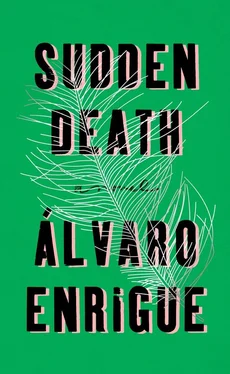
The ball court, painted with lime on the turf, was divided in half, and each half was divided into four smaller parts. A player was assigned to each quadrant and couldn’t leave it. Points were scored by passing the rubber ball through a big wooden ring fixed to the wall. If the ball touched the ground, the team that hadn’t made the error won the serve and could shoot for the ring on the first throw. The players rotated and changed court whenever one of the teams had lost the serve thirteen times.
The match was exciting. Apan won. Cortés collected a sum — a dizzying sum, even — from the other gamblers. The Spaniards who had followed him, convinced that they were passing unnoticed as they shrank in their glaring, noisy suits of armor, had watched the match from the opposite side of the trench with no one paying them the slightest attention: if their boss was with Captain Cuauhtémoc, they could do as they pleased. They thought that at last they had been accepted, even commenting among themselves that they should come to see matches more often.
Walking back to the quay, Cortés felt secure enough to ask the prince why he wasn’t taking the opportunity to kill him. My men are far behind, he said; and there are so few of them that the people could easily subdue them. It was the emperor’s request, the prince replied, whispering into Malitzin’s ear. Not to kill me? To talk, make friends; to see whether you would explain why you haven’t left. To the Indian, Malitzin said: I’ve already explained why you spare him, but he doesn’t believe me, and she translated for the Spaniard. Then she asked the future emperor motu proprio : Would you have killed him? So fast that he’d be picking up his own head. You don’t have a dagger. That’s never stopped me, he said, and he explained how a hasty sacrifice to the gods was made on the battlefield: You put the fingers of both hands into the enemy’s mouth, you pull on his teeth in both directions until his jaw snaps, then you break his spine with your knee and yank off his head. She felt a tingling between her legs and the urge to have her breasts touched. He was still staring at her impassively; what he had described was exactly what he would have done. What’s happening, asked Cortés. She told him. He wasn’t amused.
When they reached the outer courtyard of the palace, crammed with bureaucrats hearing the rather vociferous complaints of the inhabitants of the realm, Cortés returned the cacao beans that Cuauhtémoc had loaned him to bet with. Thank him, he said to Malitzin; not for these, but for having kept his word. The Indian looked at him indifferently and answered: Tell him that sooner or later we will face each other in battle, and then I won’t let him go. And yet I will spare his life, answered Cortés, but Malinche didn’t translate.
Six years later, on Shrove Tuesday, 1525, when Cortés gave the Indian Cristóbal the order to garrote the emperor in chains, everything had gone so wrong and everyone had changed court so many times that Malitzin was called Marina and it was Cortés who was called Malinche. By now everyone spoke everyone else’s languages, and without realizing it they had established a third nation, blind to its own beauty, that no one has ever been able to understand. May your God never forgive you, Malinche, said Cuauhtémoc — now in Spanish — to the conquistador by way of farewell. Don’t curse me, replied the captain in Nahuatl; I let you live when your empire was reduced to a barge. I don’t curse you for my death, said the emperor, but for all the other deaths; in this land no one will speak your name without shame. Very likely the four thousand masses that Cortés ordered to be said for the repose of his soul were conceived at that instant.
When I myself visited the convent of the Irish sisters in Castilleja de la Cuesta, I asked the mother superior about the ghost of the conquistador. We’ve never seen him, she said in all seriousness; though there were mothers in the past whom he tried to engage in fornication. And she continued: What he did leave us is a lot of dead people we can’t understand, because they speak a language from somewhere else. There’s a very handsome one, she said, who can’t walk; he has a funny ponytail, on top of his head instead of at the back. Does he make trouble, I asked. He’s sitting in that chair, she said.
Treasury of the Castilian or Spanish Language

Ball, or Pelota.Familiar object, with which one plays. There are many different balls; but the most common is stuffed with hair, pelo , from which it gets its name. It is round in shape and divided into quarters. One plays with it in the trinque , a kind of court, and that is why the small ball struck with a stringed racket is called a trigonal .
SEBASTIÁN DE COVARRUBIAS, 1611

The popes of the Counter-Reformation were serious men, intent on their work, with little trace of worldliness. They put people to death in volume, preferably slowly and before an audience, but always after a trial. They were thoroughly nepotistic and they trafficked in influence as readily as one wipes one’s nose on a cold day, but they had good reason: only family could be trusted, because if a pope left a flank exposed, any subordinate would slit his throat without trial. They had no mistresses or children; they wore sackcloth under their vestments; they smelled bad. They were great builders and tirelessly checked to see that not a single breast appeared in a single painting in any house of worship. They believed in what they did. They would never have been seen degrading themselves, at a tennis or fencing match; they didn’t go to the queeny parties that blared across the Tiber.
After nineteen years of ostracism, when Cardinal Montalto emerged in a golden carriage to occupy his rooms at the Apostolic Palace with the plans of the future city of Rome under his arm, he gave his sister Camilla Peretti the Boleyn ball.
Camilla Montalto di Peretti was an elderly widow, with the sorts of habits that might be expected of a cardinal’s closest confidante, but she had daughters who — unlike her and the recently anointed Pope Sixtus V — made a life for themselves at court and played tennis: it was what was expected of young and comely millionairesses. “It’s like a ball game,” said Jacinto Polo de Medina in 1630 in The Garden Academies , referring to the personal finances of princesses, “in which women like better to take service than to give it.”
Sixtus V and his sister were of truly humble origin: they were the children of a mule driver and a washerwoman and they had been orphaned early on, the ten brothers and sisters between them dead or gone. Camilla, fourteen years younger than the pope, had grown up in tow of her brother as he became altar boy, seminarist, and priest. Her first memories were of the years when he was already scaling the ties of the cardinal’s mantle, spurred on by extraordinary ambition but also by the responsibility of elder brothers toward those born after them, a force of nature in itself.
It was fear of want that made her brother beat all records for the raising of palaces and the reconstruction of roads in Rome, as if to expel the phantom of poverty from the city it fell to him to govern. It was not Camilla’s fate to face such a fear. She was a simple woman, who never minded acting as a kind of lady-in-waiting to Montalto, and who, though capable of enjoying the advantages of being sister to the pope, didn’t lose her head over them either. If she happily assumed the duties of Vatican princess, sharing in the ostentation of the Palazzo Montalto, it is also true that once her brother crossed the Tiber and changed his name to Sixtus, she wrote to her friend Costanza Colonna to ask for a place in her loggia, more modest and easier to oversee than the monstrous mansion where Montalto had put his theories on the redesign of Rome into practice. In addition to being discreet, Camilla was a cultured woman, so she loved the idea of retiring to the medieval mansion in whose gardens the poetess Vittoria Colonna had hosted gatherings frequented by Michelangelo.
Читать дальше













